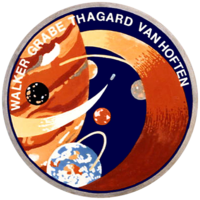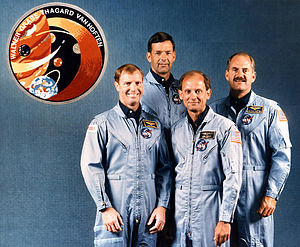STS-61-G was a NASA Space Shuttle mission planned to launch on 20 May 1986, using Atlantis. The main objective of this mission was to launch the Galileo spacecraft toward Jupiter using the Centaur-G upper stage. It was canceled after the Space Shuttle Challenger disaster.
| Names | Space Transportation System |
|---|---|
| Mission type | Galileo spacecraft deployment |
| Operator | NASA |
| Mission duration | 4 days, 1 hour, 11 minutes (planned) |
| Spacecraft properties | |
| Spacecraft | Space Shuttle Atlantis (planned) |
| Launch mass | 116,831 kg (257,568 lb) |
| Landing mass | 88,881 kg (195,949 lb) |
| Payload mass | 22,064 kg (48,643 lb) |
| Crew | |
| Crew size | 4 (planned) |
| Members | David M. Walker Ronald J. Grabe Norman E. Thagard James D. A. "OX" van Hoften |
| Start of mission | |
| Launch date | 20 May 1986, 20:21:00 UTC (planned) - Never launched |
| Rocket | Space Shuttle Atlantis |
| Launch site | Kennedy Space Center, LC-39A |
| Contractor | Rockwell International |
| End of mission | |
| Landing date | 24 May 1986, 21:32:00 UTC (planned) |
| Landing site | Kennedy Space Center |
| Orbital parameters | |
| Reference system | Geocentric orbit (planned) |
| Regime | Low Earth orbit |
| Perigee altitude | 298 km (185 mi) |
| Apogee altitude | 307 km (191 mi) |
| Inclination | 34.30° |
| Period | 90.60 minutes |
 STS-61-G mission patch  David M. Walker, Ronald J. Grabe, Norman E. Thagard, James D. A. "OX" van Hoften Cancelled Shuttle missions | |
Crew
edit| Position | Astronaut | |
|---|---|---|
| Commander | David M. Walker Would have been second spaceflight | |
| Pilot | Ronald J. Grabe Would have been second spaceflight | |
| Mission Specialist 1 | Norman E. Thagard Would have been third spaceflight | |
| Mission Specialist 2 | James D. A. "OX" van Hoften Would have been third spaceflight | |
Crew notes
editJohn M. Fabian was scheduled to fly as Mission Specialist 1 on his third trip to space, but he took advice from his wife who had earlier told him that "his marriage had a two-flight limit", he soon resigned from this mission.[1] His replacement was Norman E. Thagard.[2] Most of the crew sans van Hoften flew on STS-30 in May 1989, with Mary L. Cleave taking the place of van Hoften and the addition of rookie Mark C. Lee. Galileo was launched on STS-34 in October 1989, using the Inertial Upper Stage (IUS) booster instead of the Centaur-G (which was canceled in 1986).
See also
editReferences
edit- ^ "John M. Fabian, Interviewed by Jennifer Ross-Nazzal, Houston, Texas – 10 February 2006". NASA Johnson Space Center Oral History Project - Edited Oral History Transcript. NASA. 10 February 2006. Retrieved 29 January 2022. This article incorporates text from this source, which is in the public domain.
- ^ "The new shuttle crews are named". Lodi News-Sentinel. 20 September 1985. Retrieved 29 January 2022.